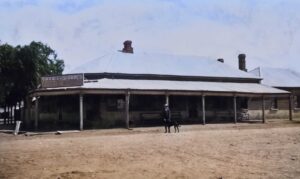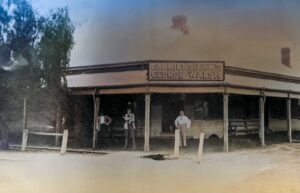Along with the Royal Hotel, The Gladstone and the Great Western, the Carriers Arms was known as a ‘union establishment’ and was patronised by those who were affiliated with union ideals. In 1892 this included noted Australian poet and writer, Henry Lawson, who referenced the hotel by name, and sometimes as ‘The Shearer’s Arms’ in many of his works describing Bourke.
Watson Braithwaite (‘Watty’) was the licensee in 1892-1893 and Lawson had a particular affection for him. Watty was previously the publican of the Warrego Inn at Enngonia and later kept a hotel on the corner of George Street and Goulbourn Street in Sydney which he named the Bourke Hotel.
Lawson’s sketch of Watty Braithwaite quietly suffering the sanctimony of the Salvation Army prayers in the dusk of the Bourke summer is a wonderful portrait;
When the kindly hours of darkness, save for light of moon and star,
Hide the picture on the signboard over Doughty’s Horse Bazaar;
When the last rose-tint is fading on the distant mulga scrub,
Then the Army prays for Watty at the entrance of his pub.
Now, I often sit at Watty’s when the night is very near,
With a head that’s full of jingles and the fumes of bottled beer,
For I always have a fancy that, if I am over there
When the Army prays for Watty, I’m included in the prayer.
Watty lounges in his arm-chair, in its old accustomed place,
With a fatherly expression on his round and passive face;
And his arms are clasped before him in a calm, contented way,
And he nods his head and dozes when he hears the Army pray.
And I wonder does he ponder on the distant years and dim,
Or his chances over yonder, when the Army prays for him?
Has he not a fear connected with the warm place down below,
Where, according to good Christians, all the publicans should go?
But his features give no token of a feeling in his breast,
Save of peace that is unbroken and a conscience well at rest;
And we guzzle as we guzzled long before the Army came,
And the loafers wait for ‘shouters’ and — they get there just the same.
It would take a lot of praying — lots of thumping on the drum —
To prepare our sinful, straying, erring souls for Kingdom Come;
But I love my fellow-sinners, and I hope, upon the whole,
That the Army gets a hearing when it prays for Watty’s soul.
George Walsh, former publican of the Grass Hut hotel, took over from Braithwaite in 1901. When they moved to the Carriers Arms their popularity in the district came with them and Walsh’s beer was recognised as the coldest obtainable in Bourke. Walsh had the business for sale in 1907 but was still publican in 1910.
With its brick construction the hotel did not suffer the ravages of fire so common in country pubs, and therefore continued operations through most of the 20th century, changing publicans regularly, and the trade being recorded faithfully by the Tooths and Co representatives. In November 1962 the long verandah which had fronted both streets collapsed in a high-wind event. A smaller corner awning over the entrance was re-established but the walls were now exposed to the elements and the slow deterioration of the old bricks began.
The hotel, which provided over a hundred years of storied service was still in operation in the 1980s and was a regular flashpoint in the Wide Comb disputes and riots of that decade, perhaps foreseen by Henry Lawson all those years ago when he wrote in his poem ‘Bourke’:
To hint a bushman was not white, nor to his Union straight and true,
Would mean a long and bloody fight in Ninety-one and Ninety-two.
The yard behind the Shearers’ Arms was reckoned best of battle grounds,
And there in peace and quietness they fought their ten or fifteen rounds;
After over a hundred years of service to the Bourke district, the Carriers Arms quietly slipped away as the new decade of the 1990s emerged, and while the building served other purposes, and still stands in Bourke today, it is beyond repair and crumbling slowly into its story-rich foundations.

The Pubs & Breweries of Bourke
From its earliest days Bourke has always had a reputation as a drinking town and it’s no wonder as it was, in fact, founded by publicans!



